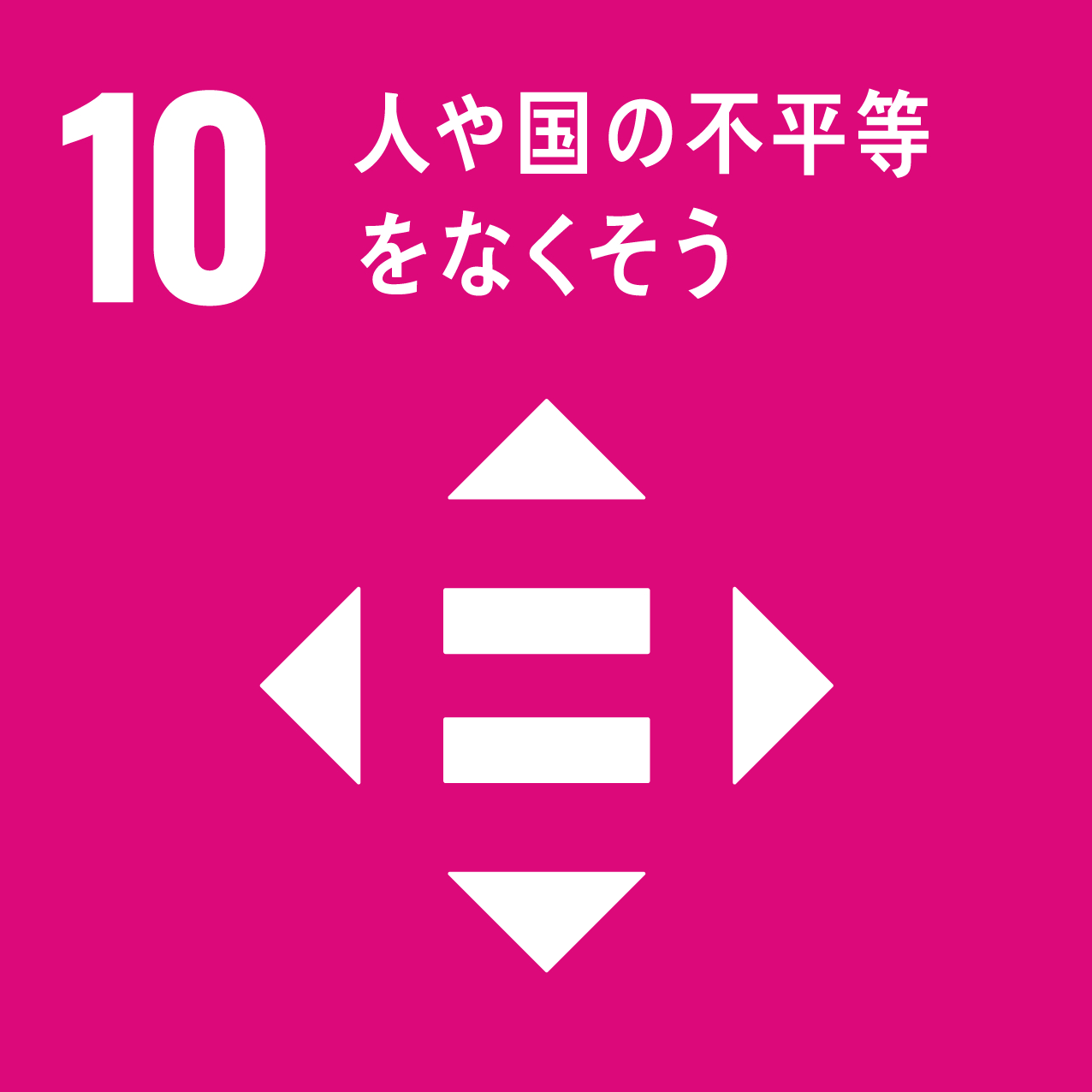目標 10 :人や国の不平等をなくそう

(原文:Reduce inequality within and among countries.)
- 10 – 1 : 2030 年までに、各国のなかで所得の低いほうから 40 %の人びとの所得の増え方が、国全体の平均を上回るようにして、そのペースを保つ。
- (原文:By 2030, progressively achieve and sustain income growth of the bottom 40 per cent of the population at a rate higher than the national average.)
- 10 – 2 : 2030 年までに、年れい、性別、障がい、人種、民族、生まれ、宗教、経済状態などにかかわらず、すべての人が、能力を高め、社会的、経済的、政治的に取り残されないように進める。
- (原文:By 2030, empower and promote the social, economic and political inclusion of all, irrespective of age, sex, disability, race, ethnicity, origin, religion or economic or other status.)
- 10 – 3 :差別的な法律、政策やならわしをなくし、適切な法律や政策、行動を進めることなどによって、人びとが平等な機会(チャンス)をもてるようにし、人びとが得る結果(たとえば所得など)についての格差を減らす。
- (原文:Ensure equal opportunity and reduce inequalities of outcome, including by eliminating discriminatory laws, policies and practices and promoting appropriate legislation, policies and action in this regard.)
- 10 – 4 :財政、賃金、社会保障などに関する政策をとることによって、だんだんと、より大きな平等を達成していく。
- (原文:Adopt policies, especially fiscal, wage and social protection policies, and progressively achieve greater equality.)
- 10 – 5 :世界の金ゆう市場と金ゆう機関に対するルールと、ルールが守られているか監視するシステムをよりよいものにして、ルールが、よりしっかりと実行されるようにする。
- (原文:Improve the regulation and monitoring of global financial markets and institutions and strengthen the implementation of such regulations.)
- 10 – 6 :世界経済や金ゆう制度について何か決めるときに、開発途上国の参加や発言を増やすことによって、より効果的で、信頼できる、だれもが納得することのできる制度を作る。
- (原文:Ensure enhanced representation and voice for developing countries in decision making in global international economic and financial institutions in order to deliver more effective, credible, accountable and legitimate institutions.)
- 10 – 7 :計画にもとづいてよく管理された移住に関する政策を実施するなどして、混乱がなく安全で、手続きにしたがい責任ある形の移住や人びとの移動を進める。
- (原文:Facilitate orderly, safe, regular and responsible migration and mobility of people, including through the implementation of planned and well-managed migration policies.)
- 10 – a :開発途上国、特にもっとも開発がおくれている国々に対して、世界貿易機関(WTO)協定にしたがって、貿易において、特別な、先進国と異なるあつかいをする。
- (原文:Implement the principle of special and differential treatment for developing countries, in particular least developed countries, in accordance with World Trade Organization agreements.)
- 10 – b :もっとも開発がおくれている国や、アフリカ諸国、開発途上の小さい島国、内陸の開発途上国などの、もっとも資金を必要とする国々へ、それらの国の計画にそって、政府開発えん助(ODA)や直接投資などの資金が流れるようにする。
- (原文:Encourage official development assistance and financial flows, including foreign direct investment, to States where the need is greatest, in particular least developed countries, African countries, small island developing States and landlocked developing countries, in accordance with their national plans and programmes.)
- 10 – c : 2030 年までに、移住労働者が、自分の国にお金を送る時にかかる費用が「送る金額の3%」より低くなるようにし、「送る金額の5%」をこえるような費用がかかる送金方法をなくす。
- (原文:By 2030, reduce to less than 3 per cent the transaction costs of migrant remittances and eliminate remittance corridors with costs higher than 5 per cent.)
子ども訳出典:(公財)日本ユニセフ協会「SDGs CLUB」
https://www.unicef.or.jp/kodomo/sdgs/17goals/10-inequalities/
※日本ユニセフ協会の子ども訳をもとに、教育出版編集局で一部手を加えています。
目標 10 を実現するために、私たちができること。
- ①さまざまな不平等について知ろう
-
- 世界の人口は約 77 億人。その 6 割にあたる約 46 億人の貧しい人たちの資産を合計した金額は、世界的な資産家 2153 人の資産を合計した金額よりも少ない(※出典「Time to care (Oxfam)」より)。世界的にみれば、それほど貧富の差が広がっている。
- 貧富の差だけが、不平等をまねくわけではない。ほかにも男女のちがい、障がいの有無によるちがい、人種や民族のちがい、宗教のちがいなどから、さまざまな不平等が生まれている。
- できること
- 貧富の差や不平等について考えてみよう。
国と国だけでなく、同じ国の人と人の間でも貧富の差が広がっているよ。
- ②移民問題について知ろう
-
- さまざまな事情から、もともと住んでいた国を出て、別の国へ移り住む人たちのことを移民という。
- 移民を受け入れている国や地域では、もともと住んでいる人たちが「安い賃金で働く移民がやってくると自分たちの仕事をうばわれる」と考えて移民に反対することがある。
- 移民が定住して人口における割合が増えると、自分たちとはちがう文化や宗教の考えなどを受け入れられずに、いやがらせをする人たちがいる。移民の子どもや孫にあたる 2 世や 3 世までもが差別に苦しむこともある。
- できること
- ほかの国からきた人に接するとき、どういう態度をとるべきか、考えてみよう。
国内外を問わず、自分とちがう考え方や習慣をもつ人たちについて、どんなとらえ方をしていたかな?
それぞれの考え方を尊重し、ちがいを認めていきたいね。